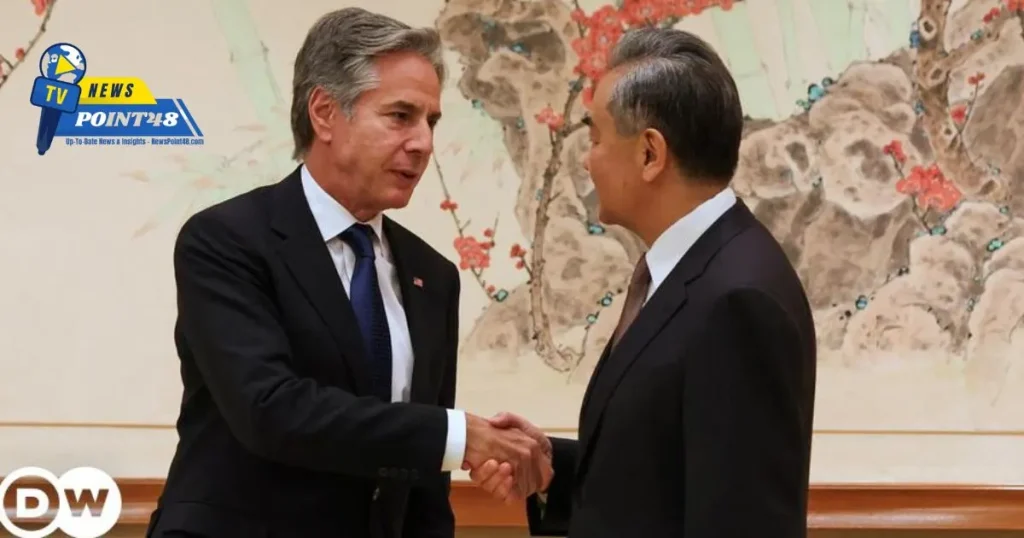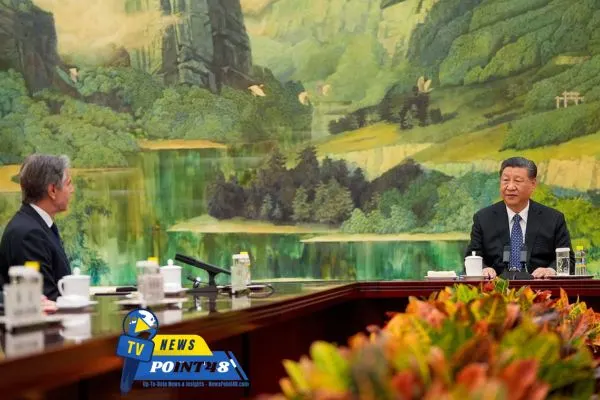
The moment also comes amid broader concerns about Beijing’s position in the ongoing Ukraine crisis following a high-profile meeting between U.S. Secretary of State Antony Blinken and Chinese officials. Beijing has framed itself as a peace broker, but Blinken has been skeptical, saying that the rhetoric from China in support of peace efforts “just isn’t consistent” with actions elsewhere on the world stage. This blog will delve into the diplomatic dynamics, tensions, and takeaways from that meeting specifically around key issues to China and Ukraine as well as the broader contours of its geopolitical role.
Blinken in China: What to Watch
Blinken’s trip to China comes at a crucial time for the world when US-China tensions still linger. The talks were known as a “strategic dialogue,” and were an effort to stabilize the relationship between the two superpowers, according to State Department officials working on several critical areas including trade, Taiwan, and human rights in China, as well as conflict over Ukraine. While the focus of the meeting was on reducing tensions between China and America, Ukraine played an important role in it.
China has avoided taking sides in the Russia-Ukraine conflict, but it has been criticized by Western countries for providing indirect support to Moscow — both economic and diplomatic. China has previously refused to join U.N. resolutions accusing Russia of aggression in Ukraine, and it hasn’t vocally condemned the invasion. The countries have simultaneously undertaken peace-making initiatives while remaining openly skeptical that the other has any real desire for peace.
Blink en’s Condemnation, On Paper vs. On the Ground

After the meeting, Blinken voiced doubt over Beijing’s assertions of promoting peace in Ukraine. He noted that China’s talk did not match what it was doing, and the extensive economic connections it still has with Russia were most troubling. China professes to support peace, Blinken argued, but at the same time, it buys oil from Russia and thereby enables Moscow to fund its campaign.
In a press briefing after the meeting, Blinken commented, “The proposition that China is somehow promoting peace on the one hand and at the same time deepening its economic relationship with Russia just doesn’t add up.
The US government standoff is part of a wider worry that China does not want this conflict to end but rather considers Ukraine as an instrument to support its geopolitical goals. Despite the attempts of Beijing to reinforce its growing status in international affairs by challenging American global influence, Washington remains leery.
The Stance of China on the Ukraine Crisis
China has said it is “neutral” in the Ukraine war although Western countries see its position as ambiguous. While Beijing has urged a ceasefire and dialogue between Russia and Ukraine, it stopped short of condemning the invasion or issuing any punitive measures against Moscow.
Released in early 2023, China’s peace plan of a dozen points demanded that all sides reach an agreement on the principles of respect for sovereignty by external and internal forces, cessation of hostilities, non-use of nuclear weapons, and other terrible acts. While some countries welcomed this proposal, including the U.S. and European Union, others criticized it for having no real teeth and not directly punishing Russia for its aggressive actions.
Observers, however, contend that China’s stance is a part of its strategy of ‘hedging’ against Russia and the West. China, however, cannot afford to lose the respect of Russia that it has built up over the years and does not want to be seen as too supportive of Russia’s actions even though its strategic partnership with Moscow remains crucial in Beijing’s pursuit of a strong countervailing force against growing Western influence, particularly in light of increasing U.S. challenges.
Special Considerations for U.S.-China Relations
The Blinken-China meeting confirmed the broader nature of current tensions between the two global powers. The United States is concerned that China’s statements on the conflict in Ukraine could undermine attempts by the West to isolate Russia and force Moscow to end its invasion.
Yet the U.S. cannot afford to be wrong about a policy: It must also tamely handle China at least for the time being as well. Washington wants to at least try and avoid a complete meltdown in its relationship with Beijing, especially in areas such as trade, climate change, and global security. But Blinken’s remarks suggest that Washington will keep on pushing China to clear up its stance on the Ukraine issue and play a more active role in the real settlement.
World reacts to China’s Ukraine diplomacy
China’s stance on Ukraine has received mixed reviews internationally. China’s red lines and veto power, however, are a source of concern for many countries that adhere to Western-led principles, particularly in the Global South. They also have come to appreciate China’s commitment to dialogue and respect for sovereignty amidst their histories of Western interventionism.
But Western nations have expressed skepticism over China’s position, portraying it as a way for Beijing to sidestep alienating Russia. China, which has close relations with Russia and Western officials say is a beneficiary of the conflict due to substantial oil deals with Moscow, says the West is skewing its coverage.
The Road Ahead: What’s Next?

Blinken’s meeting with his Chinese counterparts highlights the vast nuances in U.S.-China relations. Instead, the Ukraine problem is in many ways becoming a hotter point between those willing to maintain ties on both sides of the equation. What does the future hold The main thing international observers will now look for is if China not just stops but reverses its friendly overtures or sticks to some kinds of support that aren’t direct.
The facts are that China may be a big factor in the following stages of the war on Ukraine. Or will Beijing finally choose a side between Russia and the West in support of popular demands for justice? In the interim, Blinken’s remarks point to continued extensive American doubts regarding China’s motives, indicating that coercion around Taiwan will undoubtedly compose a major fault line in the following months.
Diplomatic Tightrope
Blinken bashes China over its position on Ukraine during a recent meeting, foreshadowing an even wider balancing act for the U.S. — and China Beijing speaks of peace, however, its moves appear to point at a far more complicated geopolitical web. How these two superpowers tread this path between diplomacy and force will also almost certainly determine the future of both the U.S.-China relationship, not to mention what happens in Ukraine.
